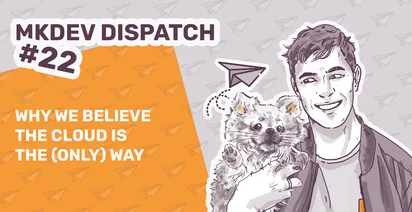Why We Believe the Cloud Is the (Only) Way | ✉️ #22

Hey! 👋
One of the most interesting news I’ve read lately is that Basecamp finished moving away from AWS. This is the topic we’ve discussed on a podcast on more than one occasion, for example in our dedicated episode about why companies leave (or enter) the cloud. 6 months after, all the workloads of Basecamp (which also includes an email service Hey.com) are running in their data center. The numbers are impressive - more than $1mln of savings per year, in return for higher performance and faster deployments. Doing a project like this in 6 months is also impressive, give the scale they’ve got.
But what I actually find interesting about it is how the discussion inside the community is framed. The opinion that pops up most often is that 37Signals is.. wrong. Depends on a person, it’s a different explanation why they are wrong. Sometimes it’s because they did not know how to use the cloud properly, sometimes it’s speculating that they don’t care about the product and just want to squeeze as much money as possible from existing customers, sometimes it’s because they underestimate the complexity of running things on your own hardware. I find it curious, because 37Signals did address all of those concerns even before the migration.
They spent months optimizing AWS usage. They have over a decade of experience running the things on-prem. They are, basically, a successful, highly profitable business, that keeps growing, launching new features regularly, and they’ve been doing this since a couple of decades. In other words, 37Signals does know what they are doing, and they articulate why they do what they do pretty well. At mkdev, we use Basecamp for all our work since half a decade, and I use Hey for my personal email. In both cases, everyone is happy, as a customer - which matters the most, for a product company that 37Signals is.
So why is the negativity and push back of just an idea that running things off the cloud can be good ($1.2mln per year and higher performance good)? I think, it’s because at this point it’s hard to admit that cloud is not the only viable option to run your infrastructure. We’ve been, for the lack of a better word, brainwashed by the promise of cloud (which I am totally sold on, don’t get me wrong), to the point that our brain refuses any alternative as blasphemy.
And as hard as it might be to admit for many people, it comes down to very good marketing from the people behind AWS, Azure, GCP and other, smaller clouds. On our podcast, we just spent some time on discussion why huge events like Formula1 are drowned in AWS and Oracle logos, as one example. We like to think, that our strong belief in the cloud is a purely logical, data-based knowledge. In reality, we might have just ignore the idea of the best tool for the job, or forget that “the job” is different from product to product, from company to company. I admire the brave - and the right - call of 37Signals to do the math and go against the flow. All of us need sometimes such a solid, data-based and production-based alternative opinion (or, frankly speaking, a slap in the face - and even, judging by the community response, that’s how this migration felt to many people), so that we stay real, and remember that there is no silver bullet and even if the cloud is the best thing for many cases, it’s not the best thing for all the cases.
What We've Shared
Videos this time include..
What is Buildah? A short video that is exactly what it's called.
How to encrypt disks in GCP? Another very practical instructional video.
And on the site our Helm Lightning Course continues to be written down with..
Helm Templates and Values: Make Re-usable Helm Charts!
'DevOps Accents', episode 14: devopsdays Amsterdam 2023: The Aftermath. In this episode of DevOps Accents, Pablo, Leo and Kirill discuss the latest conference we've sponsored and the conference experience in general.
What We've Discovered
AWS CodeGuru Security released in preview: AWS SDLC offering keeps growing. We wonder at which point we'll see these services widely used.
Serverless Web Analytics: Self-hosted, fully serverless alternative to Google Analytics. SPA behind CloudFront, Lambda saving to Firehose and then S3, and Athgena for querying - simple and beautiful.
How To Monitor AWS IAM Root Users At Scale: Best Practices: Solid advises on how to harden your root users, and to monitor their activity as well. Not that there should be any activity coming from the root user most of the time.
All the Hard Stuff Nobody Talks About when Building Products with LLMs: A wonderful case study of using LLM for a real product feature, and why it’s not all rainbows and unicorns on the way. Prompt injection problem is especially scary.
Warden: Real Time Anomaly Detection at Pinterest: Insights of how internal anomaly detection platform of Pinterest is built.
A random reminder
Not only can you meet us this month in Munich, we also give away stuff on the conferences! Last time we gave out an iPad Pro. So, if nothing else, join us for GREED :)
The 23rd mkdev dispatch will arrive on Friday, July 21st. See you next time!
